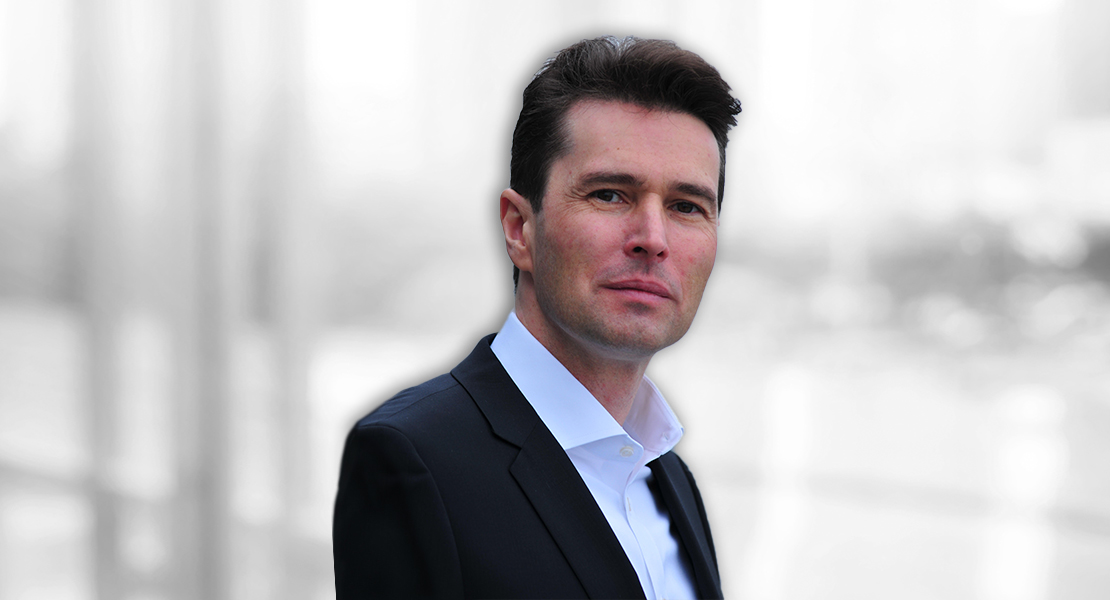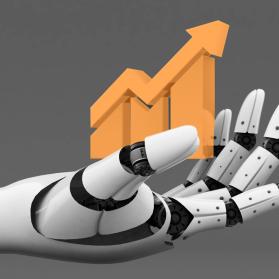Dr. Marcell Vollmer has been chief innovation officer at Celonis since August 2019. In this interview with our Detecon consultants, he talks about Celonis’ process mining technology. The goal of greater transparency and better visualization is the optimization of operational processes and the realization of a higher level of automation, enabling companies to increase efficiency and achieve their sustainability goals. You will also learn about Marcell Vollmer’s visions for Celonis and how important sustainability is for the company.
Growth in global real gross domestic product has weakened in recent years. The foreseeable recovery of the global economy in 2020 is now in hiatus because of the coronavirus crisis. Do you expect to see increased demand for efficiency measures at Celonis in these economically uncertain times?
Marcell Vollmer: Even before the spread of the coronavirus, economic growth was expected to slow down to some degree in 2020. The discussion had in consequence already shifted in the direction of automation, digitalization, and potential for cutting costs last year. This trend has been tremendously accelerated by the current crisis. Our technology can help companies to understand and to adapt critical supply chain and liquidity processes, necessary actions for overcoming this crisis. Celonis helps to understand supply chain processes that may need to be adapted to the current situation to ensure that products, whether medicines, food, or other critical goods, are delivered quickly to customers. Celonis also helps to identify risks in the supply chain and to gain insight into risk factors such as the likelihood of certain suppliers being unable to deliver on time. The system can propose alternative suppliers who will more probably be able to deliver as required.
Do you expect the current situation to spur companies to invest in technologies like Celonis – investments that until now had been kept on the back burner?
Yes, definitely, that’s pretty much the gist of it. The demand for our software will continue to grow because companies are now paying more attention to efficiency; indeed, they have no other choice. We not only help to increase process efficiency per se, but also ensure that companies can concentrate more closely on their core business.
There are other questions that are at least equally important. How can Celonis help business departments to identify and serve market demand more effectively? And how can companies use customer experience data to gain a better understanding of their customer data and use what they learn to generate added value for their customers? This approach helps companies to stake out an optimal position for themselves, and that is exactly what they must do now.
What opportunities does process mining with Celonis offer in terms of increasing efficiency?
Celonis is known as the market leader for the topic of process analytics – process mining as a technical term. We offer methods for the visualization of processes and the inclusion in the very next step of any required optimization and automation measures directly in the backend systems. This is our great strength: we transparently describe relatively complex enterprise resource planning structures. In Europe and Germany, such structures are based mostly on SAP systems, but CRM systems or databases also come into play; however, the system landscape plays only a limited role. Celonis is absolutely IT-system agnostic.
Can you be more specific?
Whenever companies have IT systems in place – and so generate transactional event data – we can visualize the entire process very precisely and, with the support of our technology, determine the points in the process where transactions are running relatively smoothly and where a high level of automation has already been achieved. In addition, we can spot potential bottlenecks and identify areas with a lower degree of automation, higher post-processing requirements, or suboptimal processes.
Shared service centers are a good example. Every day, shared service centers around the globe receive countless invoices – many of them still as paper documents – that do not display any order numbers. The first step in their processing is manually determining correlation with the correct order number. For example, the system checks whether there is an order number and the supplier merely forgot to enter it or whether the business department initiated the order without observing the purchasing process. Such procedural steps in the process are, of course, an unnecessary expenditure of time and effort.
Let’s return to the topic of a possibly imminent recession. Do you see a chance, especially now, for German companies and medium-sized businesses to push ahead with their digitalization projects?
Many companies are already actively driving digitalization. But, as we see, there are significant regional differences. In the USA, there is a very sharp focus on profound modifications of business models or even the development of entirely new ones. In Europe – and that means in Germany as well – the scope of this development is heavily dependent on the specific industry and sector. The procurement sector, for example, certainly acknowledges that digitalization is necessary and that the business model is changing the fundamental way of doing business. But if you ask what has actually happened so far, you will be amazed to hear that, despite the agreement of 83 percent with the statement that "Digitalization is changing my sector,” very little progress has been made in terms of actually realizing it. So people are aware that digitalization is important, but for now, they are continuing with business as usual. The risk is obvious: companies have not yet initiated the right measures that will prepare them for the future.
In what areas can process mining support companies with specific measures?
The technology of process mining helps to analyze and visualize all processes – from the supply chain to manufacturing and accounting to processes at customer interfaces – and to reveal where automation potential exists. Why is Amazon or Uber so successful, for example? Because the ordering process is extraordinarily simple and designed from the customer perspective. Amazon is a process company, not a product company. Uber is a service company for the brokerage of driving services. Extreme care was taken to ensure that all processes interlocked seamlessly. And that is precisely what process mining makes possible. It makes companies fit for the future.
What is your product vision for 2025 in terms of innovations – for robotics process automation (RPA), just as one example?
Companies will continue to drive digitalization forcefully and need support for customer-centric and highly efficient processes. Celonis helps to accelerate digital transformation and offers cloud solutions that enable companies to manage all business processes efficiently and effectively.
Concerning RPA, the question for me is rather whether technologies like RPA are still needed at all. RPA is a good way to bridge gaps where there is a lack of integration. However, I think it is important to find and eliminate the cause, not just to treat the symptom. RPA works more on a symptom level. In contrast, we try to penetrate the depths of the systems and reveal the root cause when, for example, the order number for a processed order is not shown on the invoice. Our focus is more on long-lasting changes.
For instance, S/4HANA has been sold to a lot of companies, but its implementation is still lagging, and the required migration process opens up major opportunities for process mining. Or if, for example, companies change the systems for which system-specific robots have been programmed, the robots will become useless in the future. As soon as one small component in the system is changed, the robot no longer functions. To be sure, the robot can be reprogrammed from scratch, but it makes more sense to integrate the automated process seamlessly into the system landscape so that it works there. This is exactly what we try to achieve with process mining.
So you are building the perfect world?
There is no such thing as a perfect world. Nor is there any such thing as perfect software. But we can make the world a better place. This is the motivation of the three founders of Celonis, whose innovation has developed into a technology that, starting from Germany, is in demand all over the world. Our contribution was acknowledged last year when Celonis won the Future Prize of the German Federal President as well as the Game Changer Award from Bain and Manager Magazin, just to mention two awards. And Gartner has now defined process mining technology as a separate category and recognized Celonis as the clear market leader.
One topic that certainly needs a lot of innovation is sustainability. Does Celonis have the potential to make a company more sustainable? Are there any thoughts, perhaps even initial experience, with the first companies to be using Celonis for this purpose?
Sustainability is a top issue, and not just a momentary hype; it will continue to be important in the long run. We have only this one planet. Many companies have designated sustainability as one of their primary goals; we support this goal and are pursuing it internally at Celonis as well. We can contribute to companies’ sustainable operation and the achievement of their sustainability targets through transparency and more efficient processes.
Transparency along the entire supply chain is especially important. Customers are increasingly critical about the origins of products. The palm oil in Nutella – is it from a sustainable source or not? Where does the cotton used to make my sweater come from, and what about the cobalt for the electric batteries in Tesla vehicles? What are the living and working conditions at the production site? Celonis’ software can ensure that companies obtain end-to-end transparency along the full length of the supply chain, including proof that only products from sustainable suppliers are used.
Detecon has recently become one of Celonis’ partners. Part of our management and technology consulting work in the future will include the implementation of Celonis solutions for our clients. Please complete the following sentence: Partnership with partners like Detecon means for me …
... that our customers have the best of both worlds. On the one hand, there is Celonis, which provides the platform with its technology. On the other hand, the partners exploit their industry and process expertise to ensure the best possible added value from implementation and use of the software. Another aspect is the better scalability. We currently have 800 employees and are growing very fast. But we need partners who can handle the demand for implementation in every respect from our constantly growing customer base. Now and in the future.
The interview was conducted by Florian Zenke, Christian Trost and Dominik Söhnle.







